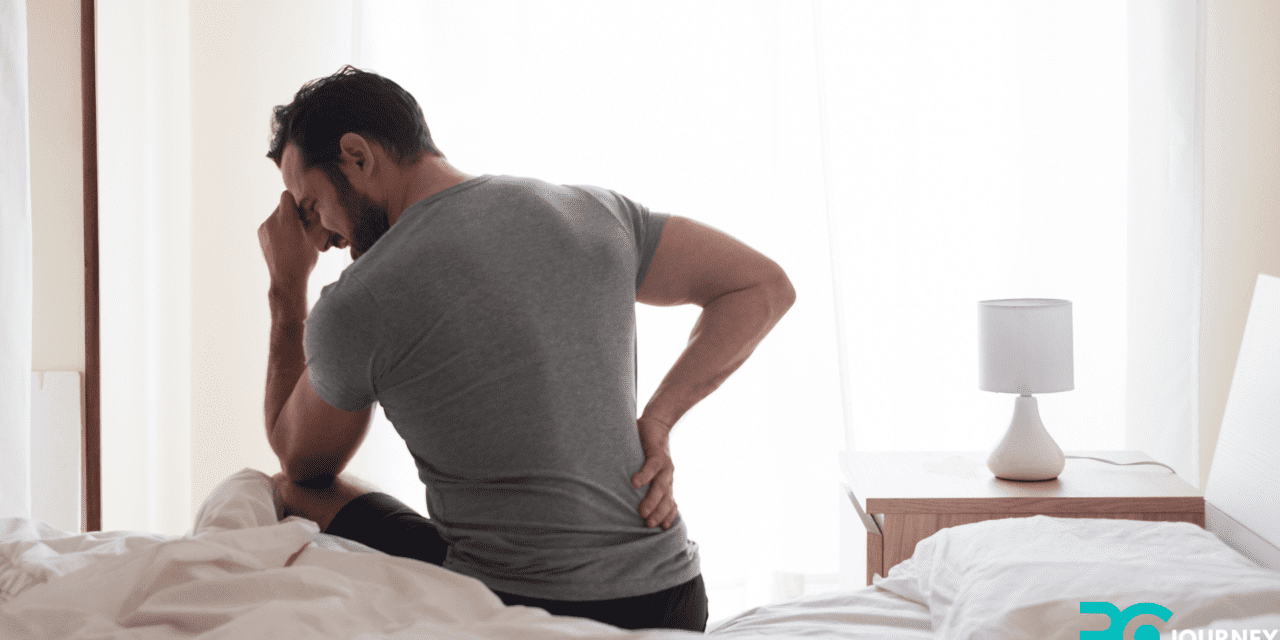Most of the time, when we think of back pain, our minds quickly shift to physical activities and injuries. However, for many individuals, upper back pain after sleeping is a common issue that can be attributed to poor sleeping positions or an unsuitable mattress. Waking up with a sore and stiff upper back can ruin your entire day and significantly impact your productivity.
If you’re experiencing upper back pain after sleeping, it’s crucial to address the root cause rather than just relying on painkillers. In this article, we’ll explore effective tips to help you fix upper back pain after sleeping.
Waking up with upper back pain?
Poor posture
The most common reason why people experience back pains after they sleep is because they do not observe proper sleeping posture. Our muscles and joints might get strained by wrong or awkward ways we rest.
Type of mattress you are sleeping on
A mattress that is too soft or too hard can fail to support the spine leading to discomfort, stiffness and pain in the upper back.
Incorrect pillow height or type
Incorrectly chosen height or type of pillow can also cause upper back pain. If the height of your pillow is not right, it leads to strains in the muscles of your neck and shoulders which bring upper-back pain.
Stress and muscle tension
Stress is one of the factors that can contribute to upper back pain after sleeping. When we are stressed, our muscles tend to tense up and this tension can be transmitted to our sleep, leading to discomfort and pain.
Traumatic Injury
In some circumstances, upper back pain after sleeping may be a sign of a more serious problem than just a strained muscle. If your back pain is severe and persistent, it is also essential for you to consult with a doctor.
Herniated Disc
Upper back pain after sleeping may also be caused by a herniated disc. One of your spinal disks can move out of position and press against the nerves in this condition.
Pregnancy
Upper back pain after sleeping can be justified by pregnancy itself. The baby pushes on the back as it grows and you will feel uncomfortable.
Fibromyalgia and other health conditions
The upper back pain you feel after sleeping may be due to Fibromyalgia, arthritis, or other chronic health conditions you may be suffering from.
What is the first aid for upper back pain?
Applying Heat Therapy: By putting a heating pad on or going in for a hot shower, you can make minefields relax to help relieve pain for an interim period of time.
Massaging Techniques: Also a gentle massage of the affected area can aid in raising the pain threshold by releasing tension and knots.
Over-the-counter pain relievers: If the pain persists, you can take an over-the-counter pain reliever such as ibuprofen or acetaminophen. However, make sure to consult with a doctor before taking any medication.
Try yoga or meditation: Yoga or meditation may be tried. These practices can help one to relax and reduce pressure on the body, both of which are helpful for upper back pain.
How to relieve upper back pain while sleeping?

It is important to address the root cause of your upper back pain for a real solution. Even though first aid may provide a temporary reprieve, we need to do research and look at the problem in depth.
Here are some tips that can help:
Improving sleep posture: Try sleeping on your side or back with a pillow that supports your head and neck in a neutral position.
Invest in a supportive mattress: A medium-firm mattress can give you the perfect balance between comfort-ability and support for your spine.
Back pain relief: Choose Best Pillows for Back Pain. Your pillow should keep your head, neck and shoulders in line together with the body when you’re asleep. Consider trying different types of pillows until you find one that works for you.
Regular exercise and strengthening routines: Strengthen core and back muscles through regular and strength training programs, which can improve posture and keep the risk for upper back pain. Exercise targeting these areas should be built into your daily life.
Stress management techniques: Tips for managing stress find ways to manage stress such as meditation, deep breathing or therapy. This will help remove the tension from your muscles while sleeping.
When to Seek Medical Advice?
While these tips can resolve most cases of upper back pain after sleeping, it’s essential to consult with a doctor if the pain persists or becomes severe. This could be a sign of an underlying health condition that requires medical attention.
Conclusion
upper back pain after sleeping is a common problem that can affect our daily lives. By addressing the root cause and implementing these tips, we can find relief and improve our overall sleep quality. Remember also to practice good sleep hygiene habits, such as maintaining a consistent sleep schedule and creating a comfortable sleep environment.
FAQ’S
Additional tips for preventing upper back pain
Why do I wake up with upper back pain?
Prevention is always better than treatment when it comes to back pain. Here are some additional tips that can help prevent upper back pain after sleeping:
Proper lifting techniques: When lifting heavy objects, make sure to use your legs and keep your back straight.
Good posture during the day: Maintain good posture during daily activities to prevent tension in your upper back muscles.
Limit screen time before bed: The blue light emitted from electronic devices can disrupt our sleep patterns and contribute to muscle tension.
Avoid sleeping on your stomach: This position puts strain on the neck and shoulders, leading to upper back pain.
By incorporating these habits into our daily routines, we can help prevent upper back pain and improve our overall well-being. Remember to listen to your body and seek medical advice if the pain persists or becomes severe.
What is the best sleeping position to avoid upper back pain?
While everyone’s body is different, generally, sleeping on your back or side with proper support is the best position to avoid upper back pain. Avoid sleeping on your stomach, as it can strain your neck and shoulders.
Experiment with different pillows and mattress firmness levels to find what works best for you. Additionally, incorporating regular exercise and stress management techniques can also help prevent upper back pain while sleeping. So, try out these tips and find the best position for a good night’s sleep!
How often should I replace my mattress?
A good quality mattress should last for about 7-8 years, but this can vary depending on the type of mattress and how it’s used. If you start experiencing discomfort or pain while sleeping, consider replacing your mattress.
Additionally, if you notice sagging or lumps in your bed, it’s a sign that it needs to be replaced. A supportive and comfortable mattress is crucial in preventing upper back pain after sleeping. So, make sure to invest in a new one when necessary!
Can certain sleeping positions cause upper back pain?
Yes, certain sleeping positions can contribute to upper back pain. Sleeping on your stomach can strain your neck and shoulders while sleeping in a position that doesn’t properly support your spine can also lead to discomfort. It’s essential to find a position that is comfortable for you and provides proper alignment for your spine. If you experience upper back pain after sleeping in a particular position, try adjusting your pillow or mattress until you find the right combination for a pain-free night’s rest.
Are there specific exercises to prevent upper back pain after sleeping?
Yes, some exercises can help strengthen your core and back muscles to prevent upper back pain. Some examples include planks, bird dogs, and bridge poses. It’s essential to consult with a doctor or physical therapist before starting any new exercise routine for proper guidance and to avoid further injury.

